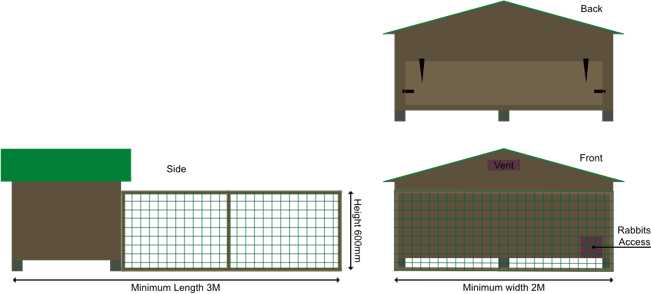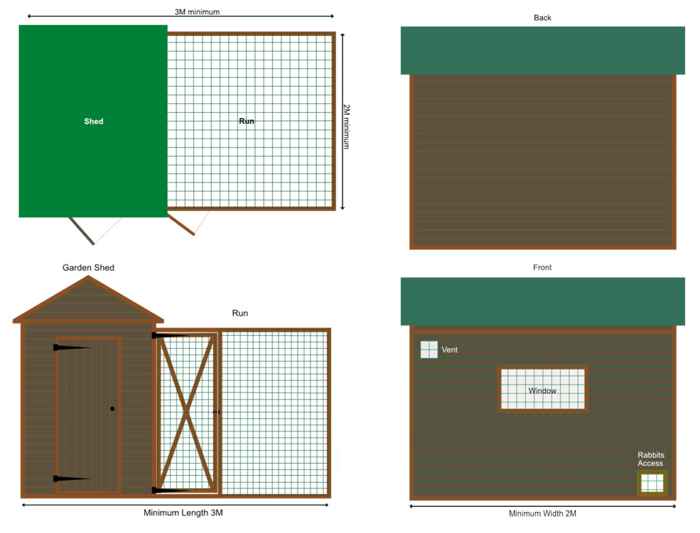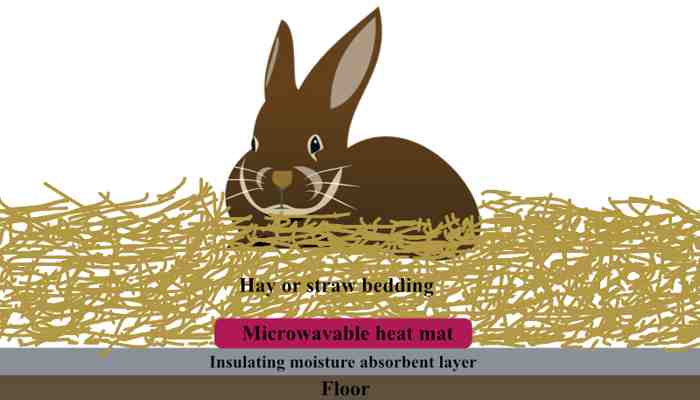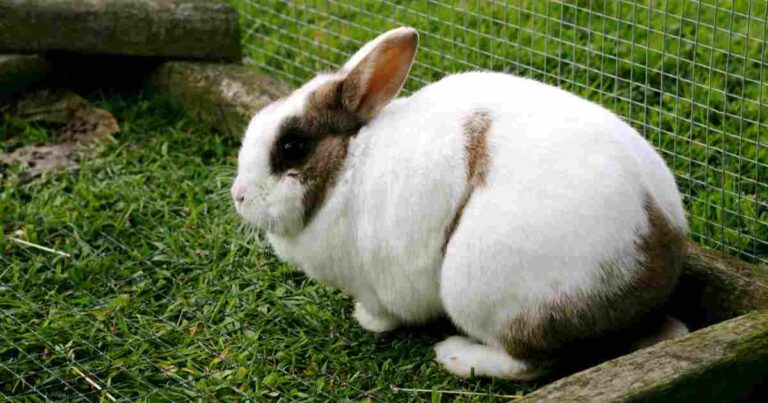Introduction
Rabbits make delightful pets, and for many prospective rabbit owners, the idea of keeping them outdoors is appealing. In this article, we’ll explore the ins and outs of keeping rabbits outside. Covering everything from housing rabbits outside to outdoor rabbit winter care. Whether you’re a seasoned rabbit enthusiast or a first-time owner. Read on to discover how to create a safe and comfortable outdoor environment for your adorable companions.
Table of Contents
Keeping Rabbits Outside
Choosing the Right Space
Before setting up an outdoor enclosure, consider the following:
location. The ideal area is quite, shaded and sheltered from high winds. However, for most finding the ideal location will be challenging. So, prioritise the shade as rabbits will quickly overheat in strong sunlight.
Predator Protection. Ensure the enclosure is secure to prevent access by predators like cats, foxes or birds of prey. And covered fully in the article predator proofing.
Digging. Rabbits instinctively dig, and you should let them. But they must not be able to tunnel their way out of the enclosure. I recommend using the same method as RABBIT PROOFING A FENCE. However, if the pen is on concrete, provide a sand pit or digging box to enable them to dig.
Size. The enclosure must meet the minimum space requirement and contain or have an attached hutch. However, the larger the area, the happier and heathier your rabbit will be.
But will rabbits be content living in the recommended minimum space? Sorry, but no! They are by nature sprinters and faster than a world champion sprinter.
So, keeping rabbits outside confined to the minimum space, is like locking Usain Bolt in a prison cell for life. Expecting him to stay physically and mentally healthy, therefore totally contented with his existence. However, allowing Usain to have daily exercise and time with his family will help maintain his mental and physical health. Hence, more content with his existence. So, be kind and allow your bunnies managed free roaming time in the garden daily.
housing rabbits outside
Their housing should:
- Be raised off the ground to prevent rotting and rising damp.
- Have keepers accesses fitted with lockable bolts.
- Remain dry with high-level ventilation.
- Have no low-level draughts.
- Be positioned with the rabbit’s access opposite the direction of the prevailing winter wind.

But if only the minimum area is available, what about the height? There is potential to increase the available area to supply the tunnels and hideaways essential to stimulate their playful nature. Just by housing your rabbits in a 2 x 1.244M garden shed with a 2M high run. Then, get creative and use the increased height to add platforms in the shed and run, accessed via non-slip ramps.

However, rabbits may injure themselves attempting to jump up and down between levels. Therefore, to avoid the risk of injury, the vertical gap between them should be a maximum of 450 mm. If you add multiple platforms, you must ensure rabbits can only jump up or down one level. Keeping pet rabbits outside increases the risk of attack from all their predators, including birds of prey. Hence, their enclosure must give ADEQUATE PROTECTION from them. It must also supply shelter from rain and shade while allowing them to exercise.
the benefits of free time
Can you bring an outside rabbit inside to play? Yes, your bunnies will love visiting your home for this. But if the area is not rabbit safe will need constant close supervision! Sadly, people often forget these tasks when they keep rabbits outdoors, which can affect your pet’s wellbeing. Giving your rabbits some free time in a fully enclosed garden will stimulate its natural behaviour. Rabbits are very inquisitive, and nothing makes them happier than being free to explore, forage and run.
But, unless your garden is PREDATOR PROOF, your rabbits will need close management and never left in the garden alone. However, if you made your garden escape proof and safe from predators. You could consider letting your rabbit free roam outdoors during the day. Greater freedom can improve your rabbits’ diet, health and happiness, while strengthening the bond between you and your family. However, while out with the rabbit in the garden, take care not to kick or tread on them.
Supporting Rabbits Living Outside
Keeping rabbits outside does not alter the fact they like routine and will require daily maintenance. Rabbits enjoy human company, and I suggest you and your family members bond with your new pet(s). Then create a daily routine, a time for cleaning, FEEDING, grooming and play, then keep to it. Bonding makes caring for rabbits rewarding for both you and them.
Keeping rabbits outside requires: –
- Cleaning the habitat, remove soiled wet bedding daily and clear the run from droppings weekly.
- Fresh food and water daily, regularly checked, because rabbits need a constant source of food and clean water available.
- Daily grooming and playing will help you check your rabbit’s health and support bonding.
Can you bring an outside rabbit inside to play? Yes, your bunnies will love visiting your home for this. But if the area is not rabbit safe will need constant close supervision! Sadly, people often forget these tasks when they keep rabbits outside, which can affect your pet’s wellbeing. Giving your rabbits some free time in a fully enclosed garden will stimulate its natural behaviour. Rabbits are very inquisitive, and nothing makes them happier than being free to explore, forage and run.
But, unless your garden is rabbit and predator proof. Your rabbits will need close management and never left in the garden alone. However, if you made your garden escape proof and safe from predators. You could consider letting your rabbit free roam outdoors during the day. Greater freedom can improve your rabbits’ diet, health, and happiness, strengthening the bond between you and your family. As long as, while managing your rabbits free time, you take care not to kick or tread on them.
Keeping Rabbits Outside warm in winter
Keeping rabbits outside does not alter the fact they like routine and will require daily maintenance. Rabbits enjoy human company, and I suggest you and your family members bond with your new pet(s). Then create a daily routine, a time for cleaning, FEEDING, grooming and play, then keep to it. Bonding makes caring for rabbits rewarding for both you and them.
Before the onset of winter, check:
- That their housing is in the correct position. (the rabbit’s entrance is opposite the prevailing wind).
- Their housing is dry, with no rain penetration or damp and free from low-level draughts.
- Your rabbit is; acclimatised to living outside and has a thick winter coat.
You have or access to:
- Hutch covers. Fitting a suitable cover or covering the habitat with a tarpaulin, without blocking the ventilation. Will add extra weather and draught proofing to help your rabbits stay warm.
- Moisture-absorbent small animal bedding or newspaper.
- A supply of dust-free dry stored bedding, hay or straw and rabbit safe microwaveable heat pads.
Preparing and Maintaining the Winter Bed
Start the bed with a base layer (small animal bedding or newspaper) to absorb the moisture and insulate the floor. Then, cover it with a layer of hay or preferably, straw for its insulating qualities. This top layer must be sufficient for the rabbits to nest without disturbing the base layer.

When keeping rabbits outside in winter, you must daily:
1. Ensure their toilet area is clean and replace wet bedding.
2. In below freezing temperatures frequently check their drinking water has not frozen!
3. Ensure their habitat is still dry and draught-proof.
4. Regularly check for signs of cold stress (shivering, huddling, and reduced activity).
5. In temperatures below 10c, provide warmth for vulnerable rabbits, and those showing signs of cold stress with microwaveable heat pads. After heating, place the pads between the moisture-absorbent layer and the bedding, to avoid burning your bunny.
Finally, it’s essential not to neglect your pets and keep to your established routine! Then add the extra checks they will need during the cold and wet winter conditions.
conclusion
I hope the topics covered in this post were helpful in your decision to keep rabbits outside. But choosing the right space and creating a safe, comfortable environment. Will help make it easier to care for and support outdoor rabbits, especially during cold wet winters.
I kept a pet rabbit outdoors as a boy, and had planned to keep Babe and Bob in my garden. That is until they convinced me there were easier, more enjoyable ways to keep these lovable pets happy. I am glad they did! Now I enjoy their company 24/7, with far less time and energy spent caring for them. Along with the bonus of not being out in all weather’s taking care of them.
Keeping rabbits outside is the most expensive, time-consuming, and least rewarding way to keep them. For me, the cons far outweigh the only pro, a little less mess to clean up in my home. Pet rabbits should be, and feel, part of your family! Which is difficult when it’s the lodger at the bottom of your garden. However, if keeping rabbits outside is your only choice. Please support them daily with your company and free time in your home or garden, especially during cold wet weather.

